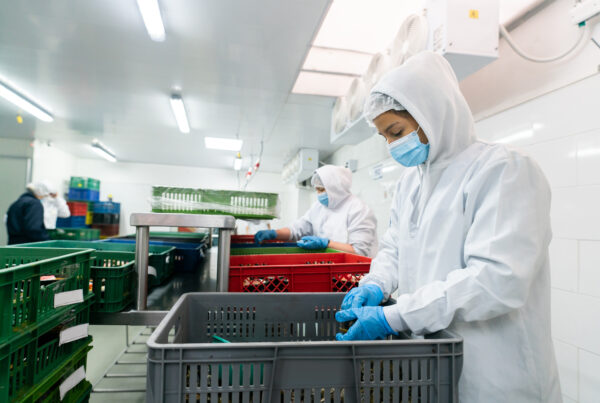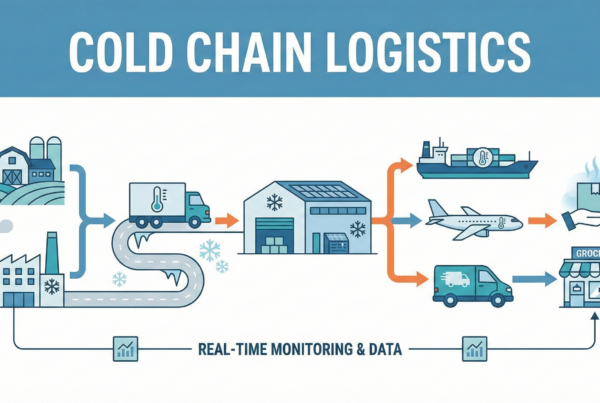If you live in the Northeast as I do, one thing is certain; The snow will fly, hurricanes will make landfall, and seawalls will breach.
Today I am enjoying a mild September afternoon. It’s early September, so it still feels a lot like summer. This time of year, I’m often greeted by a warm sun and a slight breeze whenever I get a chance to enjoy the outdoors. It truly feels refreshing coming off of a hot and humid August. It’s too bad days like this one are now numbered. That said, I still get to look forward to the picturesque colors of the changing foliage, a traditional Thanksgiving, and hopefully a dusting of snow on Christmas morning.
The slight changes I am sensing today in barometric pressure, humidity, and temperature tell me that winter weather is on the way, regardless of whether I am ready. As a New Englander and a diehard Bostonian, I can handle that. However, as a freight forwarder who specializes in transporting perishable merchandise, life can become a lot less certain.
We’re all familiar with the adage, “If you don’t like the weather, wait 10 minutes”. For me, that statement is never more accurate than when I’m glued to the Weather Channel or some other local news outlet tracking the path of an impending storm. The most recent example I can think of is Tropical Storm “Hernan” which all but promised to devastate Cape Cod & The Islands and bring strong winds and flooding as far north as Boston and Salem. Good thing I never got around to taping up the windows at home. Hernan was a flop. I have seen passing spring showers that packed more of a punch.
The cynical side of me bristled with irritation at the rating blitz that had hijacked my fellow New Englanders and me. News networks are a business, and they have a product to sell. If you own a bakery, you must put bread in the window, right? You have to keep the eyes of the passer-by enticed. What better sales device to have at the ready than a sprinkle of fear-mongering? What better way to keep the eyes of the masses riveted to the hi-def display window in their living rooms? But then the more urbane part of me realized that weather is wildly unpredictable and that meteorology is hard science and an invaluable asset to our society. Where would we be without it? Inevitably there will be another “Hernan” or perhaps a winter blizzard that will not be so kind to us next time around. Because of that inevitability, the freight forwarder in me stays tuned and prepares for the worst.
Shipping perishable cargo is a delicate dance on the best of days. There are so many moving parts that need to operate congruently for the system to work effectively. Add a severe weather event to the mix, and one can see how truly fragile such a system can be. In my experience, it often comes down to a few capable and dedicated individuals who truly understand the sensitive nature of perishable shipping, those who step up and keep the wheels turning both literally and figuratively. On our best day, it is those individuals who rise to the occasion to preserve the trust of the customer and the integrity of their products.
Preparedness is critical, and it goes without saying if one is operating a refrigerated cargo facility in the Northeast that things like backup generators and emergency lighting are always at the ready and routinely inspected. That said, communication is of primary importance when an emergency event looms on the horizon. Receiving and relaying updates from our partner carriers both in the air and on the ground is invaluable. Keeping our customers and shippers apprised in advance of local weather updates and regional conditions can help them determine whether it is advisable to ship and which shipping method to use.
The limited shelf-life of the products we handle dictates a continuous supply chain with little room for delay. But I think most would agree that no amount of seafood or produce is worth risking the wellbeing of the individuals sustaining that supply chain. Any responsible, well-informed manager or business owner knows when it’s time to take stock of an unfolding weather event and call it a day. It is never a decision to be taken lightly. I can count on one hand the number of times our facility in Boston has closed down due to a weather event in the last 25 years, but it certainly has happened.
In most instances, after evaluating travel conditions and communicating with our partners, vendors, and customers, an informed determination is made as to which employees can safely come to work and which employees can work from home or simply take the day off. Focus then shifts to the movement of any perishable cargo in the pipeline. Our hours of operation are reduced so the work gets done swiftly and accurately, but with the safety of our employees and partners kept paramount.
My personal streak of cynicism towards the weatherman may or may not be well earned. But one thing is for sure; extreme weather events will continue and worsen. Subsequently, consistent advancements in meteorological technology from Doppler and Next-Gen Radar to weather satellites and buoys have provided the opportunity to improve severe weather detection drastically. Yet even with these resources at our disposal, our best-laid plans can often deteriorate rapidly in the face of an unpredictable force like extreme weather. Therefore, the ability to pivot quickly and adapt on the fly is often our best asset and is an essential quality of those on the front line of any freight forwarding operation.
I am a freight forwarder in the Northeast United States who specializes in the transportation of perishable goods. I am one individual among an innumerable amount of dedicated and knowledgeable professionals who feed the world through their hard work and dedication. It is an honor to do this type of work every day when thought of in those terms. My colleagues and teammates throughout Commodity Forwarders and Kuehne + Nagel offer an unquantifiable amount of experience that allows every office in our network to function at the highest level and truly cater to our clients’ individual needs come hell or high water.



